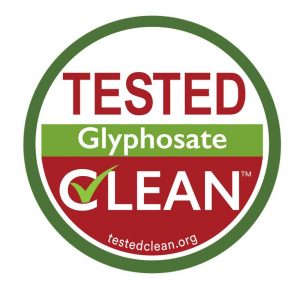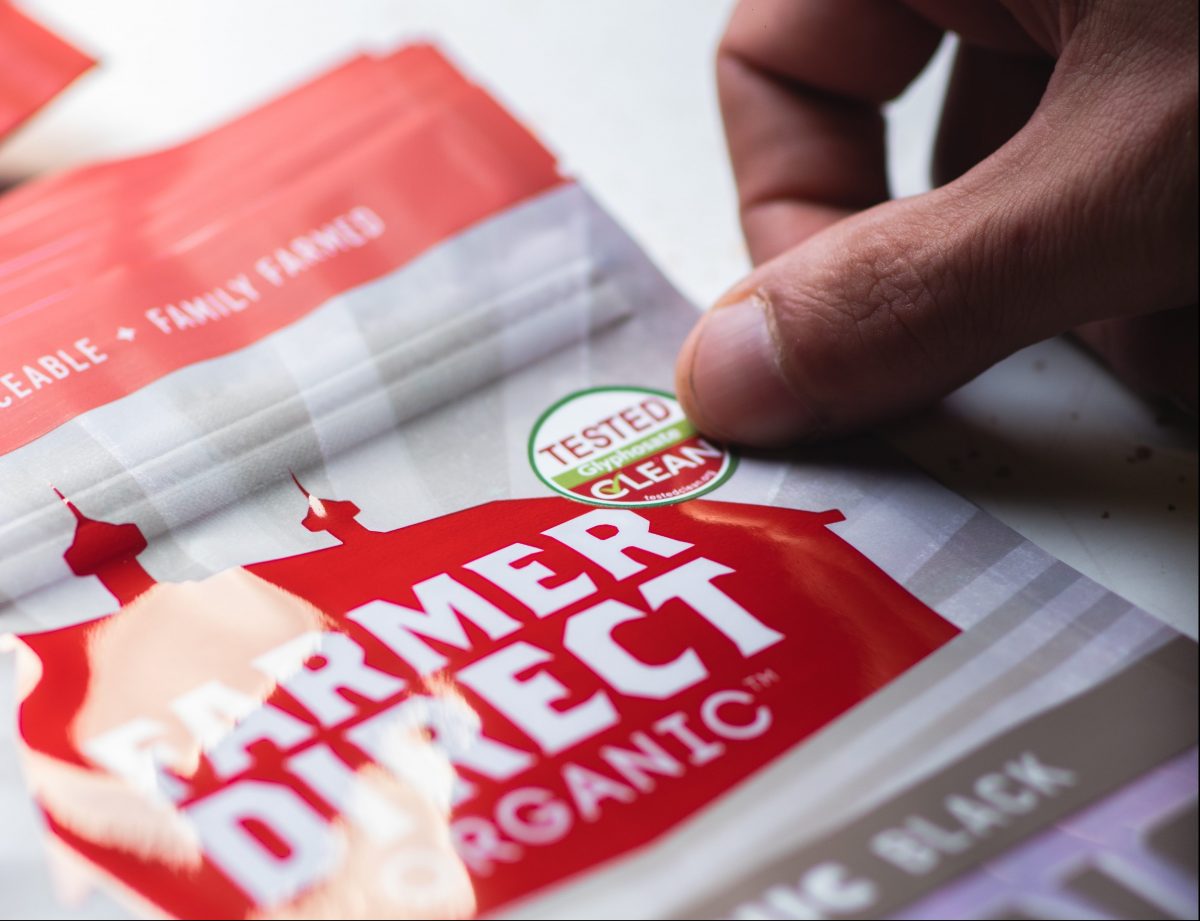Last year, Health Research Institute launched its Tested Clean for glyphosate certification, a program that aims to focus attention on the farmers and food brands that have taken extra steps to eliminate residues of glyphosate herbicide from their products and protect consumers from the controversial weedkiller.
The program was the first of several Tested Clean certifications that HRI has developed.
“Transform chemical agriculture to regenerative organic”
The current agricultural system with its heavy use of pesticides like glyphosate has proven to be a disaster for both human health and the environment, according to John Fagan, chief scientist and CEO of Health Research Institute, a nonprofit research and education institution.
 “Agriculture today generates food that is not healthy and full of pesticides at levels that can damage health,” he says. “The food system is degrading soils at an extremely rapid rate and of all greenhouse gases being produced by humans 45% to 60% are connected to the current food production system with its use of fossil fuels.”
“Agriculture today generates food that is not healthy and full of pesticides at levels that can damage health,” he says. “The food system is degrading soils at an extremely rapid rate and of all greenhouse gases being produced by humans 45% to 60% are connected to the current food production system with its use of fossil fuels.”
As a result, Fagan says that for both the health of consumers and the planet, “there is nothing more important than to transform chemical agriculture into regenerative organic agriculture.”
Health Research Institute has been testing for glyphosate residues in foods and individuals for the past four years. Fagan says demand for the testing is growing “by leaps and bounds.”
“The food industry is increasingly aware of concerns with glyphosate. More and more food companies are testing many ingredients for glyphosate, and a growing number of grain dealers are testing grains and pulses for glyphosate before buying them.”
Tested Clean certification aims to spotlight the “heroes of agriculture,” organic farmers whose farming practices produce healthier soil that not only produces more nutritious food, but also sequesters carbon to mitigate climate change.
“When consumers see the (Tested Clean) seal they will know the food is good for them, their family, and the planet,” Fagan says.
Continuous improvement
The Tested Clean for glyphosate certification program is structured to allow for continuous improvement. Farmers and brands will have to meet certain action thresholds for glyphosate residue levels to earn the certification. Fagan says the action thresholds are both achievable for farmers and meaningful for consumers.
If testing shows their crops or products are above the action threshold but below the maximum allowable limit for glyphosate, the producer or brand must do a root cause analysis to identify and correct the source of the contamination. Their crop or product will be accepted for certification but they need to show significant improvement by the next year’s harvest.
“This is continuous improvement on a time scale that is practical for the farmer, the time scale of the crop cycle,” Fagan says.
Testing for glyphosate is necessary to facilitate improvement. “Testing data serves as a guidepost for moving things in the right direction. Without that objective guidepost it is hard to pinpoint how to improve things,” Fagan says.
Tested Clean for glyphosate certification’s maximum allowable limit for glyphosate exposure is 0.011 milligrams (mg) per day for a 150-pound person. Limits for individual dietary items are calculated based on a typical diet and portion size to keep total exposure well below the per day limit. Research by the Environmental Working Group has determined that 0.011 mg is the upper safety limit for glyphosate exposure. By contrast, the U.S. Environmental Protection Agency says it is safe to consume up to 122.5 mg of glyphosate per day, which is 11,136 times higher.
Gold standard technology
HRI uses ultra-high-performance liquid chromatography linked to triple quadrupole mass spectrometry (UPLC-MS/MS) to test for glyphosate and other pesticides. Fagan says this is the “gold standard” methodology for pesticide testing. The method is capable of quantifying glyphosate levels down to 0.05 parts per billion (PPB) and to 0.05 to 1.0 PPB for other pesticides. HRI’s UPLC-MS/MS methods are accredited to the ISO 17025 laboratory standard, which is recognized by governments and the food trade worldwide. ar
HRI has found dramatic differences in glyphosate levels in conventional versus organic crops. Tests have found that conventional grains contain from 200 PPB to as much as 1000 PPB. By contrast, Fagan says most organic grains and beans test below 10 PPB, and most vegetables and fruits are typically even less than 1 PPB.
Tested Clean for glyphosate gives organic farmers a tool they can use to control pesticide contamination. It also gives consumers an easy way of identifying products in which they can be confident. It clearly shows the difference between conventional and organic in the marketplace.
“Many studies have shown that avoiding pesticides is the largest motivator for the organic shopper. By making sure organic is clean of pesticides, we give organic a stronger position in the marketplace,” Fagan says.
In addition to Tested Clean for glyphosate, HRI also offers Tested Clean certifications for all pesticides and for the absence of antibiotics and hormones in livestock products.
Ultimately, the goal of Tested Clean certification is to create transparency enabling consumers to choose safer, more healthy food, Fagan says.
“Such food can only be produced efficiently and economically using organic practices that draw carbon out of the atmosphere and into the soil, thereby helping reverse the climate crisis naturally. Transparency is the basis for a market-driven solution to climate change and testing is the tool that makes transparency possible.”









